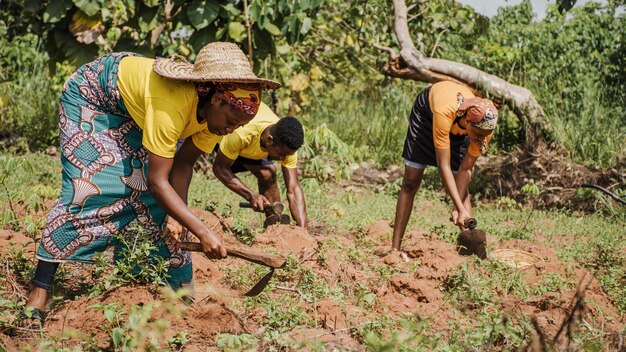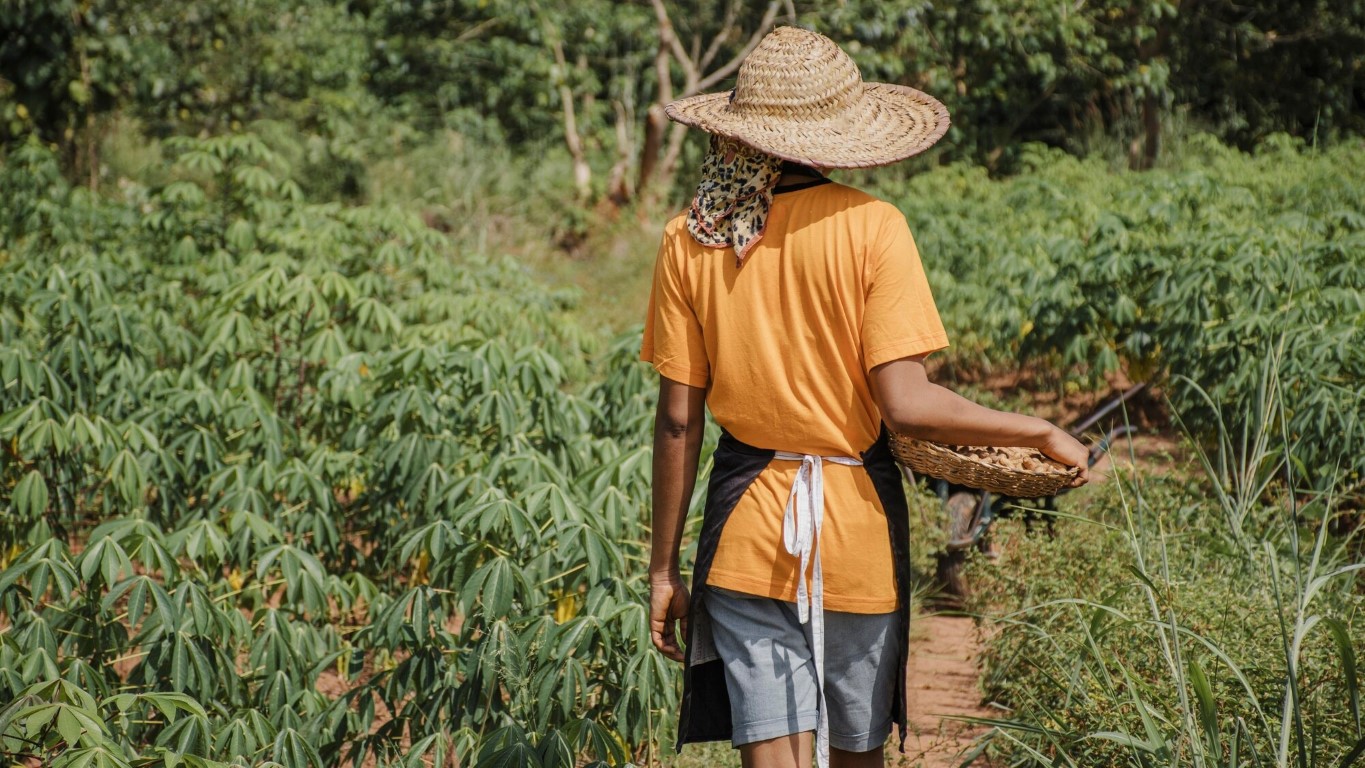2 farmers die of heart attack, some abscond from creditors
In recent times, ginger cultivation has become a lucrative farming business for smallholder women farmers in Southern Kaduna, spreading across seven of the 23 local government areas of the state. Some men are also involved. The local governments where ginger is cultivated in commercial quantity in Southern Kaduna are Chikun, Kachia, Kaura, Jaba, Kagarko, Jema’a and Sanga. To the women farmers in this business, it is like oil exploration, thereby making it a significant part of the economy of Southern Kaduna considering the value chain involved from cultivation to processing and exporting for pharmaceuticals. Interested farmers take loans from microfinance banks and other sources to invest in their farms with the hope of reaping the harvest bountifully at the end of the season and offset these loans.

As it is the practice with most of the farmers, especially the subsistent ones, the thought of insuring their farms against unforeseen circumstances like fungi attacks does not easily come by. Recently, there was a massive fungi attack that affected about 3,000 hectares (a hectare of land is about two and a half acres, about 15 plots) of ginger farm in Southern Kaduna. It was put at about N10 billion market value. According to the Pubmed Central (PMC), ginger is susceptible to a wide range of biotic and abiotic stresses that adversely affect yield, particularly bacterial and fungal diseases and one of the most significant fungal pathogens of ginger is Fusarium oxysporum f. sp. Zingiberi (Foz), the causal agent of the disease called Fusarium yellows. President of the National Ginger Association of Nigeria (NGAN), Mr. Gagarin Madaki, told Daily Sun in Kaduna that his members are still counting their losses after losing about N10 billion to the development.
He said: “The impact assessment of the fungi attack on southern Kaduna ginger farms worth N10 billion. We work with the Kaduna State Government and the Institute of Agricultural Research (IAR) who have been able to advise us on the type of fungicide to apply.
“What we are looking at now is how to raise funds for next year’s farming season. We are reaching out to all we can including the federal, state and local governments to give us inputs against next year.
“This is the first time we are experiencing this in recent times, which is why we are suspecting the fungi attack to have been masterminded by someone somewhere. Ninety percent of ginger farmers in that area are affected. Could it be about a particular new fertilizer in town? This is the common denominator we are suspecting.”
He further expressed concerns about why the fungi attack happened only in ginger farms in southern Kaduna without affecting other ginger-growing states like Benue, Plateau, Kano, and Ondo states.
“What we have discovered is that the fungi attacked only farms in Kaduna. It did not attack the ones in Benue, Kano and Ondo states. We are curious, why us? Some people planted in virgin areas and were affected. So, the issue of overuse of the land as many may think does not arise. In essence, crop rotation is not the problem. There are a lot of people who cultivated organic ginger most of whom were not affected.
“We are beginning to think maybe as a people, we should go into organic ginger. We are looking at all sorts of conspiracy theories as to why it is only in Southern Kaduna. Again, we are looking at all options and as it stands, nobody can say why this started and that is why we have embarked on research on this development.
“As I said, we are looking at getting organic seedlings but I doubt if it will be Nigerian variety. However, we are thinking of bringing a particular variety we are working on in Ghana.
“Let me also add that the unique thing about the Southern Kaduna ginger is that no matter where you bring the ginger seedling once you plant it in Southern Kaduna soil, it will enrich it and give it that unique standard that makes our ginger to be adjudged to be the best variety in the world,” he explained.
On what the association is doing, he said: “We are hoping to organize a sensitisation programme for the ginger farmers on the best practice. We are going to inform them that we are bringing organic seed even if their farms are not organic.”
A farmer, Baba Meshach, who is also the public Rrelations officer of NGAN, described the development as “heartbreaking and very unfortunate” having lost two farmers to heart attack over their losses.
“We have lost about two farmers due to heart attack on hearing the unfortunate news that their farms were affected. One of them had invested N30 million. He died of a heart attack instantly in Sabon Sarki, Jaba local government area.
“As we speak, those that could withstand the shock are not even concerned about our farms now. We are concerned about our livelihood. And you know, this is a country where you do everything by yourself.
“The affected farmers depend solely on this ginger cultivation. The least amount you can spend on one hectare is N1.8 million and some cultivated several hectares leveraging agricultural loans from microfinance banks and individuals to pay back with interest.
“So, ginger farming is a very huge investment and the loss was a catastrophe. Where will they see the money to pay back? I like what the Federal Government did. It gave instant order to intervene through the National Emergency Management Agency (NEMA) to look into it and assist the affected farmers.
“Mind you, I’m also seriously affected. I lost a minimum of N50 million because I got a contract to supply five trucks. Each truck is 30 tons. But for me, having a similar experience in the past, I did a bit of insurance which most of the affected farmers don’t do.
“Our challenge now is the seedling for next year. We hope to get seedlings in Benue and Plateau states as well as some parts of Kaduna that were not affected,” he said.
Another affected farmer, Mr. Yahuza Master Kachiya, said he and his friends were still in shock over the fungi attack in their farms located in Kachia local government area of the state.
“I cultivated just a hectare but I have friends and brothers who invested so much in several hectares. Some of them sold their animals to invest in ginger farming. You know, no one would imagine something of this magnitude, especially when the rain is favourable this year. We did not foresee this loss. We were expecting a good harvest at the end of the season.
“The commissioner of agriculture came here personally and directed us to apply an antifungal. We did without seeing any serious impact because the fungi had already affected our crop so deeply. It was as if the farms were sprayed. If it were to have affected only one farm, one would have personalise the loss,” he said.
Abdullahi Mustapha whose farm was also affected, hinted that some farmers have run away from their farms and homes because of huge debts they have incurred as a result of the fungi attack in their farms.
“I have only one hectare affected. Ginger is a lucrative farming and because of that, many people invested in it heavily. To be sincere, it is a significant part of the Southern Kaduna economy.
“Many of the affected farmers have run away, abandoning their farms and homes because of their creditors. Some ran to Abuja and some to Lagos. In my case, I lost just about N1m to the unfortunate development,” he said.
Efforts to hear from the Karuna State government through the Chief Press Secretary to Governor Uba Sani, Mr. Muhammed Lawal Shehu, and State Commissioner for Agriculture, Mr. Murtala Dabo were unsuccessful. But a credible source in the State Emergency Management Agency (SEMA), who spoke in confidence, said the state has collated the list of the affected farmers and shared it with SEMA which has also been forwarded to the National Emergency Management Agency (NEMA) for possible intervention.

